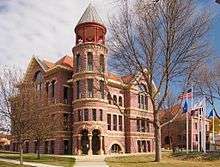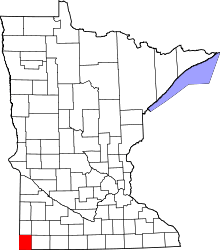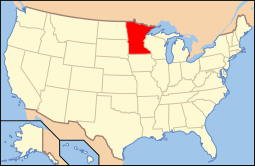Rock County, Minnesota
| Rock County, Minnesota | |
|---|---|
 Rock County Courthouse | |
 Location in the U.S. state of Minnesota | |
 Minnesota's location in the U.S. | |
| Founded |
May 23, 1857 (created) 1870 (organized)[1] |
| Named for | The prominent rock deposit in the county |
| Seat | Luverne |
| Largest city | Luverne |
| Area | |
| • Total | 483 sq mi (1,251 km2) |
| • Land | 482 sq mi (1,248 km2) |
| • Water | 0.3 sq mi (1 km2), 0.06% |
| Population (est.) | |
| • (2015) | 9,600 |
| • Density | 20/sq mi (8/km²) |
| Congressional district | 1st |
| Time zone | Central: UTC-6/-5 |
| Website |
www |
Rock County is a county located in the U.S. state of Minnesota, in the far southwestern corner of the state. As of the 2010 census, the population was 9,687.[2] Its county seat is Luverne.[3] The county was formed in 1857 and organized in 1870. Rock County was named for the rocky soil.[4]
Geography
According to the U.S. Census Bureau, the county has a total area of 483 square miles (1,250 km2), of which 482 square miles (1,250 km2) is land and 0.3 square miles (0.78 km2) (0.06%) is water.[5]

Lakes
Despite Rock County not containing any natural lakes (the other three being Mower, Olmsted, and Pipestone), it does have a small lake created by a dam in Blue Mounds State Park.
Major highways
 Interstate 90
Interstate 90 U.S. Highway 75
U.S. Highway 75 Minnesota State Highway 23
Minnesota State Highway 23 Minnesota State Highway 269
Minnesota State Highway 269 Minnesota State Highway 270
Minnesota State Highway 270
Adjacent counties
- Pipestone County (north)
- Murray County (northeast)
- Nobles County (east)
- Lyon County, Iowa (south)
- Minnehaha County, South Dakota (west)
- Moody County, South Dakota (northwest)
Demographics
| Historical population | |||
|---|---|---|---|
| Census | Pop. | %± | |
| 1860 | 23 | — | |
| 1870 | 138 | 500.0% | |
| 1880 | 3,669 | 2,558.7% | |
| 1890 | 6,817 | 85.8% | |
| 1900 | 9,668 | 41.8% | |
| 1910 | 10,222 | 5.7% | |
| 1920 | 10,965 | 7.3% | |
| 1930 | 10,962 | 0.0% | |
| 1940 | 10,933 | −0.3% | |
| 1950 | 11,278 | 3.2% | |
| 1960 | 11,864 | 5.2% | |
| 1970 | 11,346 | −4.4% | |
| 1980 | 10,703 | −5.7% | |
| 1990 | 9,806 | −8.4% | |
| 2000 | 9,721 | −0.9% | |
| 2010 | 9,687 | −0.3% | |
| Est. 2015 | 9,600 | [7] | −0.9% |

As of the census of 2000,[12] there were 9,721 people, 3,843 households, and 2,705 families residing in the county. The population density was 20 people per square mile (8/km²). There were 4,137 housing units at an average density of 9 per square mile (3/km²). The racial makeup of the county was 97.27% White, 0.53% Black or African American, 0.43% Native American, 0.62% Asian, 0.02% Pacific Islander, 0.53% from other races, and 0.59% from two or more races. 1.28% of the population were Hispanic or Latino of any race. 41.4% were of German, 23.8% Dutch and 16.5% Norwegian ancestry.
There were 3,843 households out of which 31.30% had children under the age of 18 living with them, 62.10% were married couples living together, 5.50% had a female householder with no husband present, and 29.60% were non-families. 27.00% of all households were made up of individuals and 15.70% had someone living alone who was 65 years of age or older. The average household size was 2.47 and the average family size was 3.01.
In the county the population was spread out with 26.30% under the age of 18, 7.20% from 18 to 24, 24.10% from 25 to 44, 22.00% from 45 to 64, and 20.40% who were 65 years of age or older. The median age was 40 years. For every 100 females there were 97.60 males. For every 100 females age 18 and over, there were 93.00 males.
The median income for a household in the county was $38,102, and the median income for a family was $44,296. Males had a median income of $28,776 versus $22,166 for females. The per capita income for the county was $17,411. About 5.50% of families and 8.00% of the population were below the poverty line, including 8.10% of those under age 18 and 8.90% of those age 65 or over.
Communities
.svg.png)
Cities
- Beaver Creek
- Hardwick
- Hills
- Jasper (partly in Pipestone County)
- Kenneth
- Luverne (county seat)
- Magnolia
- Steen
Townships
Unincorporated communities
Ghost towns
In popular culture
Much of the second season of Fargo is set in Luverne and Rock County.
See also
References
- ↑ "Minnesota Place Names". Minnesota Historical Society. Retrieved March 19, 2014.
- 1 2 "State & County QuickFacts". United States Census Bureau. Retrieved September 1, 2013.
- ↑ "Find a County". National Association of Counties. Retrieved 2011-06-07.
- ↑ Chicago and North Western Railway Company (1908). A History of the Origin of the Place Names Connected with the Chicago & North Western and Chicago, St. Paul, Minneapolis & Omaha Railways. p. 163.
- ↑ "2010 Census Gazetteer Files". United States Census Bureau. August 22, 2012. Retrieved October 24, 2014.
- ↑ Nelson, Steven (2011) Savanna Soils of Minnesota. Minnesota: Self. pp. 69 - 70. ISBN 978-0-615-50320-2.
- ↑ "County Totals Dataset: Population, Population Change and Estimated Components of Population Change: April 1, 2010 to July 1, 2015". Retrieved July 2, 2016.
- ↑ "U.S. Decennial Census". United States Census Bureau. Retrieved October 24, 2014.
- ↑ "Historical Census Browser". University of Virginia Library. Retrieved October 24, 2014.
- ↑ "Population of Counties by Decennial Census: 1900 to 1990". United States Census Bureau. Retrieved October 24, 2014.
- ↑ "Census 2000 PHC-T-4. Ranking Tables for Counties: 1990 and 2000" (PDF). United States Census Bureau. Retrieved October 24, 2014.
- ↑ "American FactFinder". United States Census Bureau. Retrieved 2008-01-31.
External links
 |
Moody County, South Dakota | Pipestone County | Murray County |  |
| Minnehaha County, South Dakota | |
Nobles County | ||
| ||||
| | ||||
| Lyon County, Iowa |
Coordinates: 43°40′N 96°15′W / 43.67°N 96.25°W